Introduction
Can parrots eat nutritional yeast? This is a common question among parrot owners looking to boost their pet’s nutrition. Nutritional yeast is packed with vitamins and minerals, but is it safe and healthy for parrots?
Parrots have specific dietary needs, so it’s crucial to know which foods are suitable for them. In this article, we’ll explore whether parrots can eat nutritional yeast, its benefits, potential risks, and the best way to include it in their diet.
What is Nutritional Yeast?
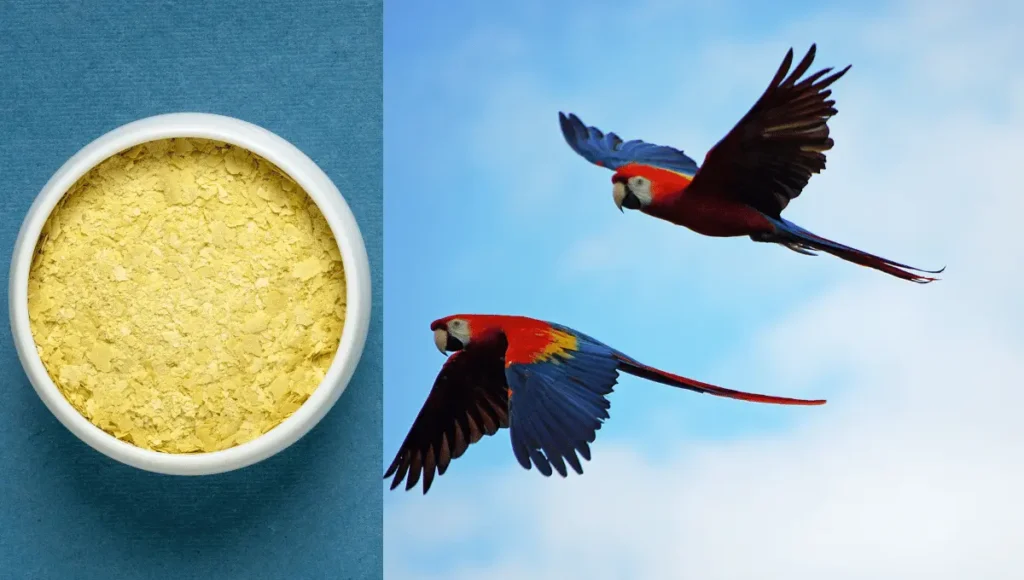
Nutritional yeast is a deactivated form of yeast, typically made from Saccharomyces cerevisiae. Unlike active yeast used for baking, it doesn’t cause dough to rise. Instead, it’s known for its nutty, cheesy flavor and its rich nutritional profile.
There are two main types of nutritional yeast:
Fortified Nutritional Yeast –
This type has added vitamins and minerals, such as B12, making it an even richer source of nutrients.
Non-Fortified Nutritional Yeast –
This type is natural and doesn’t contain added nutrients but still offers a variety of vitamins and minerals.
Nutritional yeast is commonly sold in flakes or powder form, making it easy to sprinkle over food.
Nutritional Profile
Nutritional yeast is often considered a superfood due to its impressive nutrient content. It’s especially rich in:
- B Vitamins – Particularly B12 in the fortified version, which supports energy levels and cell health.
- Protein – Nutritional yeast provides all nine essential amino acids, making it a full source of protein.
- Fiber – Promotes digestive health.
- Trace Minerals – Includes zinc, selenium, and iron, which are vital for overall health.
These nutrients make nutritional yeast a popular choice for humans, but it also raises questions about its potential benefits for parrots. Understanding its composition helps determine whether it’s suitable for your bird’s diet.
Can Parrots Eat Nutritional Yeast?
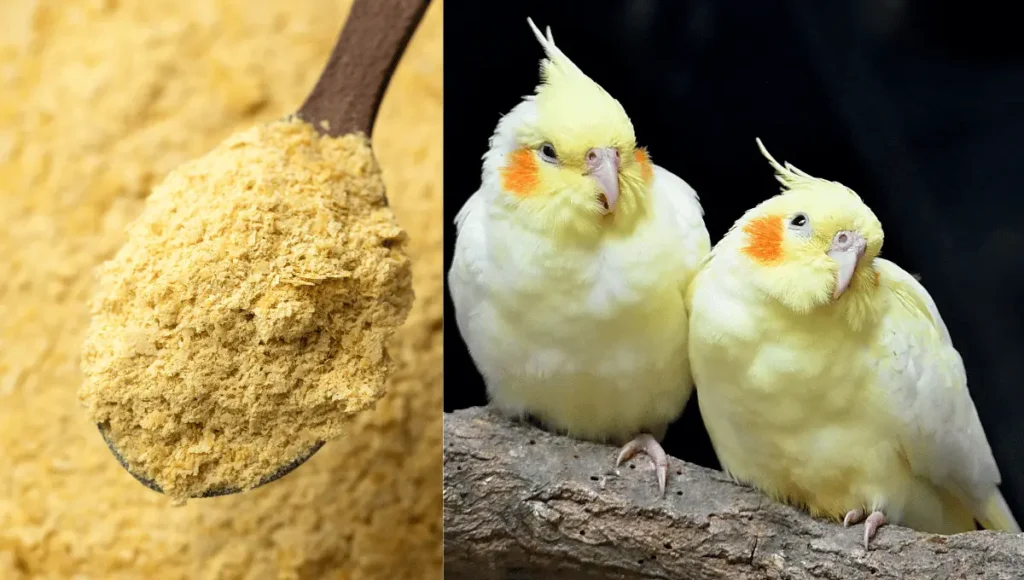
Is It Safe for Parrots?
Yes, parrots can eat nutritional yeast, but it should be offered with care. Nutritional yeast is non-toxic and generally safe for parrots when given in small quantities. Its rich nutrient content makes it appealing for supplementation, but overfeeding can lead to imbalances.
Veterinarians and avian experts suggest that nutritional yeast can be beneficial for parrots, but it is crucial to choose a pure product. Avoid versions that contain added salt, sugar, or artificial flavors, as these additives are harmful to birds. Moderation is key to ensuring safety and health benefits.
Potential Benefits for Parrots
Nutritional yeast can provide significant health benefits when included as part of a balanced diet. It is an excellent source of B vitamins, including B12, which supports energy production and overall health.
This is particularly helpful for parrots that may lack these vitamins in their regular diet of seeds and fresh produce.
The high protein content in nutritional yeast, which includes all essential amino acids, helps maintain strong muscles and supports growth in younger or breeding parrots. Additionally, its nutrient-rich profile promotes shiny, healthy feathers, thanks to components like biotin and amino acids.
Nutritional yeast also contains fiber, which can improve digestion and support a healthy gut. However, while it has many benefits, it should be viewed as a supplement rather than a primary food source.
A balanced diet of fresh fruits, vegetables, and parrot-safe grains remains essential for your parrot’s overall health.
Parrots Eat Nutritional Yeast
| Aspect | Details |
| Can parrots eat nutritional yeast? | Yes, parrots can eat nutritional yeast in moderation. |
| Benefits | Nutritional yeast provides B-vitamins, proteins, and antioxidants. It can support healthy feathers and immune function. |
| Possible Risks | Some parrots may have sensitivities or allergies to yeast. Too much can lead to gastrointestinal upset. |
| Recommended Amount | A small sprinkle or a pinch mixed with their food (no more than once a week). |
| Best Practice | Introduce slowly and monitor for any adverse reactions. Limit the quantity, as it is highly concentrated in nutrients. |
| Nutritional Content | High in protein, B vitamins (especially B12), and fiber. Can be a supplement to a balanced diet. |
| Is it recommended as a regular part of their diet? | No, it should only be an occasional supplement. Parrots need a varied and balanced diet. |
| Serving Suggestions | Sprinkle on fresh fruits, veggies, or a parrot-safe pellet mix. |
Risks and Precautions
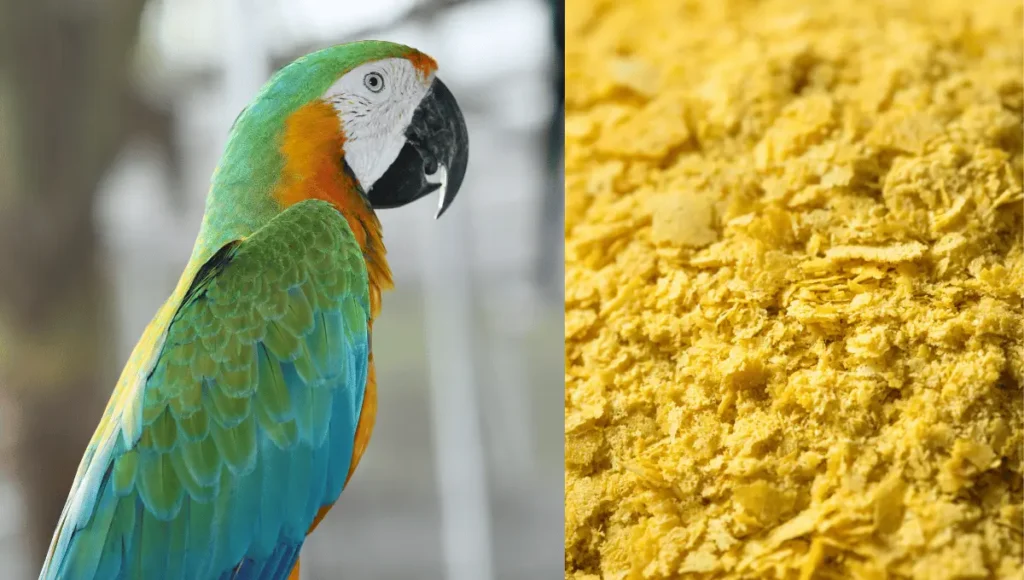
Potential Risks
While nutritional yeast is generally safe for parrots, there are a few risks to be aware of. Overfeeding can lead to an imbalance in nutrients, which may harm your parrot’s health over time. For example, too much protein or excess B vitamins might strain the liver or kidneys.
Some parrots may have sensitivities or allergies to nutritional yeast. If you notice unusual behaviors or symptoms, such as changes in appetite, digestive issues, or feather plucking after introducing nutritional yeast, it may not be suitable for your bird.
Another risk comes from certain types of nutritional yeast products that include additives like salt, sugar, or artificial flavors. These ingredients can be harmful to parrots and should always be avoided.
How to Minimize Risks
To keep your parrot safe, introduce nutritional yeast slowly and in small quantities. Start by sprinkling a tiny amount on their regular food and observe their behavior and health over a few days. Gradually increase the amount if no adverse reactions occur, but never exceed a moderate level.
Always choose plain, unsalted, and unflavored nutritional yeast. Fortified versions are generally fine, but check the label to ensure there are no harmful additives. It’s also a good idea to consult your avian veterinarian before adding new foods or supplements to your parrot’s diet.
How to Serve Nutritional Yeast to Parrots
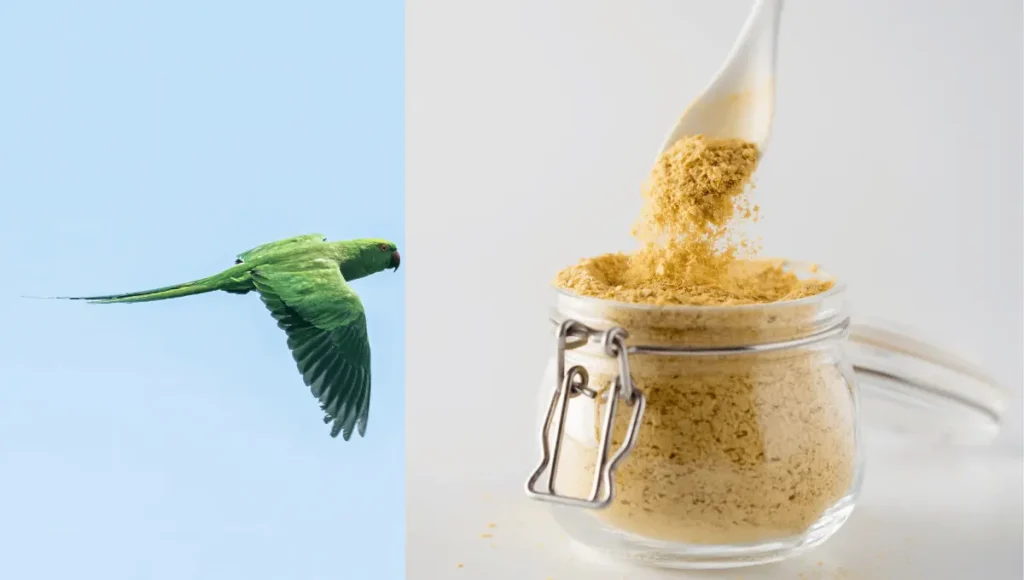
Serving Methods
When introducing nutritional yeast to your parrot’s diet, it’s important to serve it in a way that suits their preferences. You can start by sprinkling a small amount of nutritional yeast over your favorite fruits or vegetables.
Many parrots enjoy the cheesy, nutty flavor, and this method makes it easy for them to try it.
You can also mix nutritional yeast into their regular food, such as pellets or cooked grains, to ensure they get the benefits without overwhelming their meal. Just a pinch is enough to add a nutritional boost without changing the overall taste or texture of their food.
Another fun option is to mix nutritional yeast with a small amount of water or unsweetened fruit juice to create a paste. This can be spread on fresh fruit, seeds, or other foods your parrot enjoys.
Keep in mind that parrots are curious creatures and may take time to adjust to new flavors. Be patient and try different combinations to see what works best.
Dosage and Frequency
When offering nutritional yeast to your parrot, be careful not to give too much. A small amount, about 1/4 to 1/2 teaspoon, is usually enough for a medium-sized parrot. Larger birds might be able to handle slightly more, while smaller birds should be offered even less.
It’s best to serve nutritional yeast 1-2 times a week as part of a balanced diet. Since it’s a supplement, it shouldn’t replace your parrot’s regular meals. Always make sure their diet includes a variety of fresh fruits, vegetables, seeds, and pellets to ensure they get all the nutrients they need.
Alternatives to Nutritional Yeast
While nutritional yeast can offer health benefits, there are other natural supplements and foods that can also support your parrot’s nutrition.
One option is seeds like sunflower or pumpkin seeds. These provide healthy fats and essential vitamins, making them a good addition to your parrot’s diet. Nuts, such as almonds or walnuts, are another great source of protein and healthy oils. Make sure to provide them in limited amounts because of their high-fat content.
Fresh fruits and vegetables are always excellent alternatives. They offer a wide range of vitamins and minerals, such as vitamin A from carrots or vitamin C from bell peppers. Dark leafy greens, like kale and spinach, are also rich in nutrients.
Vitamin-enriched pellets are another option. These are specially formulated to meet a parrot’s dietary needs and can help fill any nutritional gaps.
Each of these alternatives offers unique benefits, and it’s important to provide a variety of foods to ensure your parrot gets all the necessary nutrients. While nutritional yeast is a helpful supplement, it’s best to combine it with other fresh, natural options for a balanced diet.
Conclusion
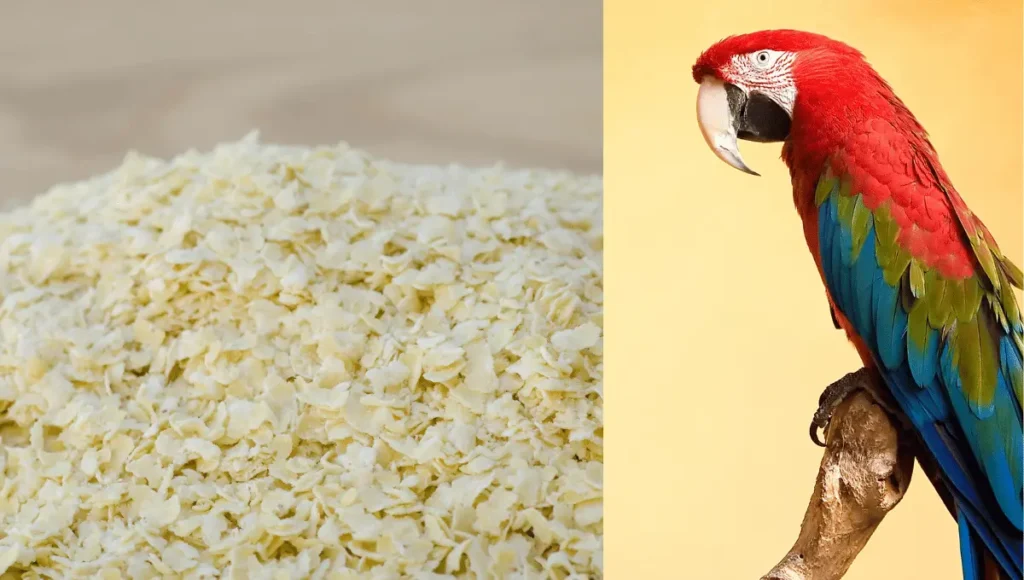
In conclusion, nutritional yeast can be a safe and healthy addition to your parrot’s diet when given in moderation. It provides valuable nutrients like B vitamins, protein, and fiber that can support your parrot’s overall health, energy, and feather condition.
However, it’s important to start with small amounts and monitor your parrot’s response to ensure it’s a good fit for them. Always choose plain, unsalted nutritional yeast, and remember that it should be part of a balanced diet, not the main food source. With the right approach, nutritional yeast can be a beneficial supplement to your parrot’s meals.
FAQs
Can all parrots eat nutritional yeast?
Yes, most parrots can eat nutritional yeast in moderation, but it’s important to start with small amounts and observe how they respond. Always consult a vet if you’re unsure about your parrot’s dietary needs.
Is nutritional yeast safe for parrots?
Yes, nutritional yeast is generally safe for parrots when given in small quantities. However, it should not replace their main diet, and you should avoid varieties with added salt or sugar.
What are the benefits of nutritional yeast for parrots?
Nutritional yeast provides essential B vitamins, protein, and fiber, which support your parrot’s overall health, energy, feather quality, and digestion.
How should I serve nutritional yeast to my parrot?
You can sprinkle a small amount of nutritional yeast over fruits, vegetables, or their regular food. Start with a pinch and gradually increase if your parrot enjoys it.
How much nutritional yeast can I feed my parrot?
A small amount, about 1/4 to 1/2 teaspoon, is enough for a medium-sized parrot. Offer it 1-2 times a week as part of a balanced diet.
Pingback: Can Parrots Eat Honey? Safe Treat or Hidden Danger?
Pingback: Can Parrots Eat Dates? A Complete Guide for Owners